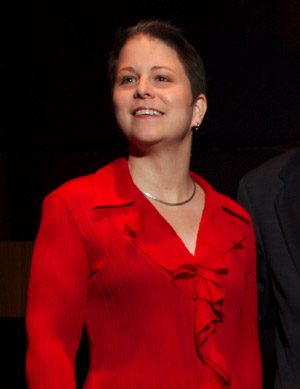Jacqueline Robarge
In a small town near the New York-Canadian border, Jacqueline Robarge survived a chaotic childhood in a family struggling with mental illness, alcoholism and abuse. At 19 she moved to San Francisco and fell in with people who, as she puts it, “were not good for me.” Only when she began to do volunteer work in a shelter for battered women did Robarge realize, “This is what I am supposed to do.”
Nine years ago, Robarge was invited to put her experience to work in Baltimore’s city jail. At that time, US Department of Justice officials were investigating claims of harmful and discriminatory conditions there. Listening to the women in the jail, Robarge discovered that an overwhelming number of them had been physically and/or sexually abused, almost half would have no stable housing to go home to, many were suffering from mental and physical illnesses and drug addiction—yet almost no services were in place to address any of these issues.
Long before the DOJ released its findings, Robarge had not only sized up the situation but decided to provide the remedy. With no funding and no staff, she resolved to offer practical as well as emotional support to women and to amplify their stories to advocate for change. In 2002, Robarge received a fellowship that enabled her to continue her jail program. The following year, a nonprofit sponsor and the first grants to the organization she founded, Power Inside, made it possible to expand its services.
In 2003, Robarge crafted a collaboration between Maryland’s Department of Public Safety and Correctional Services and Johns Hopkins University School of Public Health to collect data on the needs of women in jail. The resulting study, Release from Jail: Moment of Crisis or Window of Opportunity for Female Detainees in Baltimore City, has become a nationally recognized guide to the design and evaluation of reentry programs for women. The study, which has been replicated with men in jail, implicates the practice of repeatedly releasing and jailing the same homeless and addicted people.
Today, Robarge and her small staff provide a continuum of care that she frames as a “health and human rights response to women traumatized by violence, the street economy and the criminal system.”
Bridging the gap between correctional settings and public health and housing programs, Power Inside provides access to a range of resources for incarcerated women prior to their release. In recognition of the importance of the mother-child relationship, Power Inside makes home visits to the families of incarcerated mothers. From initial needs-assessments, to peer-led support groups and case management, including advocacy for alternative sentencing and treatment plans and testimony in court about mitigating circumstances, Power Inside programs follow the women as they serve their time.
Once released, women can drop in to Power Inside’s center for safety or rest, food, bus tokens or a phone. Street workers give out blankets, condoms and hygiene supplies and stand ready to intervene in a crisis or take women to clinics or needle exchanges.
With the “heart of a social worker and the head of a politician,” in a colleague’s words, Jacqueline Robarge works to help women heal and grow while confronting the bureaucratic hurdles, inadequate services and public indifference that block the systemic change necessary to prevent women from being re-incarcerated—or ever imprisoned at all.
 Photo by Joshua Cogan
Photo by Joshua Cogan